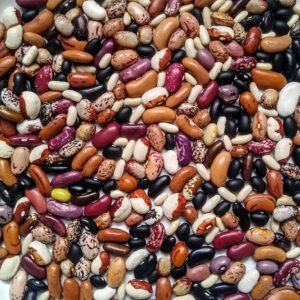
On the shoulders of giants, June 2010
Organic Seed Alliance’s mission is to support the ethical development and stewardship of seed. OSA works from the position that organic food integrity begins with organic seed integrity and our ethical approach to seed develops from this belief. Organic seed integrity includes seed that is free of contamination from genetically engineered traits. But, just as organic farming is more than farming without synthetic pesticides and fertilizers, organic seed integrity is much more than “the absence of” and includes the positive values and benefits that we bring to seed development.
While I recognize that the fear of negative impact of genetically engineered crops is a factor that drives many towards organic, I am more interested in the positive factors that drive us towards improvements in agricultural practices, such as plant breeding and seed production. If genetically engineered seed is undesirable, and organic seed is better, what is the “better” in seed that we are moving towards in the organic community? Defining ourselves by what we are not seems a shallow approach to identity and integrity. A much more powerful way to define our integrity is to describe and measure the value that organic production brings to the environment, animal health, human health, and rural economies.
Working for integrity in organic food and seed, we recognize that food systems are more than the sum of their parts. In other words respect for the autonomy, sovereignty, and relationships of plants, animals, farmers, and consumers is essential to food integrity. For example, the farmer working from the integrity level provides cows access to healthy pasture with diverse species, not only because it returns benefits to the farm ecology (such as fertility in the manure), or reduces the need for synthetic antibiotics, but primarily because it is aligned with the cow’s nature to graze, frolic, and lock horns. The cow is ethically relevant. The diverse species of plants in the pasture are relevant. The farmer’s success is relevant. The person who will drink the milk is relevant. Full-life cycles are relevant. A farmer working from this level works to encourage shared benefits from all individuals and species through collaboration and integration.
It’s this level of integrity we are looking for in organic seed systems – a new model of decentralized seed systems that serve communities of plants, animals, and people – with farmers and public plant breeders engaged in breeding crops that are adapted to local conditions and high in nutrition and flavor. This work must be done while respecting the autonomy, sovereignty, and interrelationships of plants, animals, soil, farmers, and consumers – their integrity.
OSA’s approach to seed allows for continued evolution of the plant species and improvement of the variety. In order for this evolution and improvement to occur plants must be bred in a manner that allows for natural mating and evolution as opposed to gene insertion and cell fusion, in a manner that allows for plants to co-evolve in their biotic community – including the fungi, viruses, insects that we think of as pests – that have existed side by side with them for thousands of years. These plants and pests have never been at war with each other. Why should we make it one? The war approach fails, and if anything it has made matters worse. To date our reductionist attempts to eradicate pests have only resulted in stronger weeds, insects, and pathogens, and new generations of more deadly chemicals to try and wipe them out. In organic seed systems we breed plants for tolerance to these pests, for plants able to produce good yields and nutritious quality crops. But of course sometimes the pests will take a share of the harvest, that’s the price for you pay for an integrated ecological approach to plant breeding.
OSA’s approach to seed allows farmers and breeders the right to save and exchange seed. This does not mean that royalties or other benefits cannot or should not be paid to plant breeders (including farmer-breeders), but that any such benefits must recognize the thousands of years of improvement that came before the latest generation of discovery and selection. As Newton remarked on being honored for his scientific accomplishments, “If I have seen a little further it is by standing on the shoulders of Giants.” His humble statement should be a reminder to us that no individual or corporation can ethically or morally claim ownership of our plant heritage via utility patents when, prior to our generation, countless individuals have done the work for the good of all humankind.
And, in order for farmers to be good partners in the plant breeding and seed production process they need education and training. Recognizing this need, OSA’s Research and Education team provides through our “Organic On-Farm Plant Breeding” workshops, seed production publications, conferences, and field days. They need a channel and amplifier for their voice, defending the benefits and rights of farmer-oriented public seed systems, as OSA Advocacy team does.
We have a lot of work to do. Good work – breeding new diversity and adaptation into our food crops. Along the way OSA Advocacy will also continue to work to protect organic seed from contamination from GE crops, challenge the concentrated ownership of seeds and use of utility patents to prevent seed saving, and facilitate discussions amongst those of us who rely on and benefit from ethical seed systems. That includes you – we encourage you to subscribe to our blog, become a fan of OSA on Facebook, make comments and ask questions and support our education, research and advocacy efforts with your financial contributions. Organic food integrity begins with organic seed integrity, and organic seed integrity begins with all of us getting involved. Join us.
Matthew Dillon, Director of Advocacy
